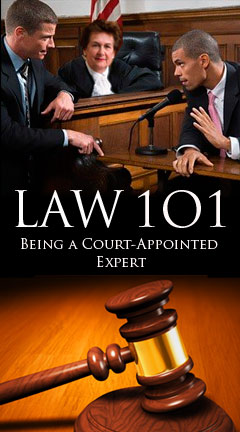Archival Notice
This is an archive page that is no longer being updated. It may contain outdated information and links may no longer function as originally intended.
Home | Glossary | Resources | Help | Course Map
Learning Objectives
After completing Being a Court-Appointed Expert, the user should:
- Know that the court may appoint its own expert, even if each side has its own expert on a particular issue.
- Know that testimony can be provided, but actual testing may not be conducted.
- Recognize applicable state statutes or criminal procedure rules.
- Know the role of the judge or special master.
- Know that the judge may ask questions when testimony is given.
Court-appointed experts fall into two general categories:
- Experts appointed by and for the court to assist the fact finder in a criminal or civil case.
- Experts appointed by the court to assist an indigent criminal defendant.
Sometimes experts are appointed by the court to provide a "third opinion," reviewing the same factual material and evidence as the parties' experts and testifying to their own conclusions.
The court might also appoint an expert in a technical case exclusively to explain to the jury the basic theories or methods they will need to understand the parties' experts. Such a court-appointed expert does not express an opinion on the facts of the case but rather serves an educational role.
When a court-appointed expert witness testifies, the witness is "called by the court," and all parties may question and cross-examine the expert witness.
Additional Online Courses
- What Every First Responding Officer Should Know About DNA Evidence
- Collecting DNA Evidence at Property Crime Scenes
- DNA – A Prosecutor’s Practice Notebook
- Crime Scene and DNA Basics
- Laboratory Safety Programs
- DNA Amplification
- Population Genetics and Statistics
- Non-STR DNA Markers: SNPs, Y-STRs, LCN and mtDNA
- Firearms Examiner Training
- Forensic DNA Education for Law Enforcement Decisionmakers
- What Every Investigator and Evidence Technician Should Know About DNA Evidence
- Principles of Forensic DNA for Officers of the Court
- Law 101: Legal Guide for the Forensic Expert
- Laboratory Orientation and Testing of Body Fluids and Tissues
- DNA Extraction and Quantitation
- STR Data Analysis and Interpretation
- Communication Skills, Report Writing, and Courtroom Testimony
- Español for Law Enforcement
- Amplified DNA Product Separation for Forensic Analysts


